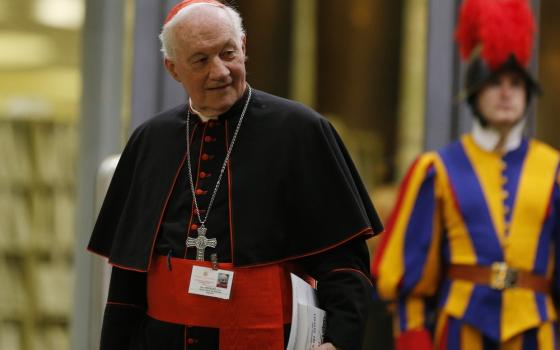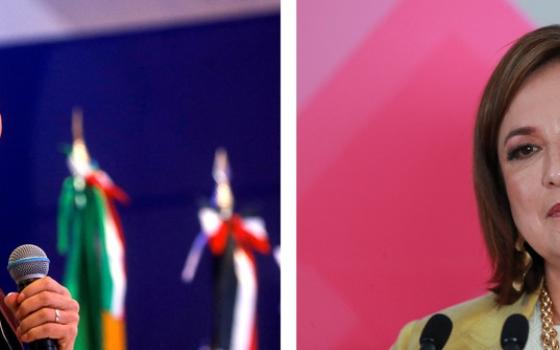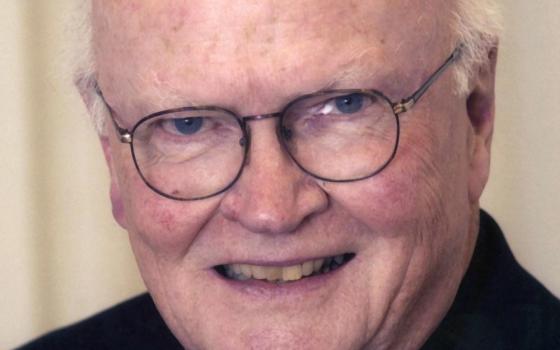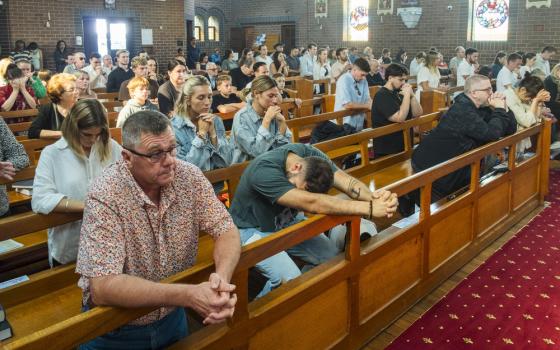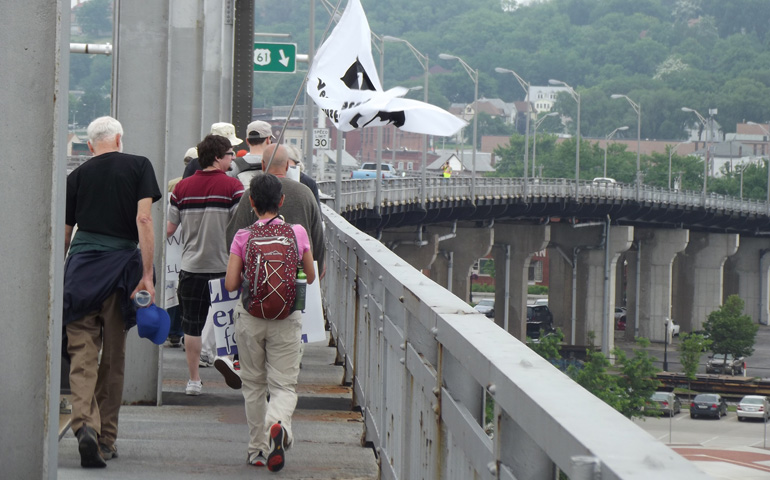
Twenty activists from the Chicago-based peace organization Voices for Creative Nonviolence are walking 190 miles to invigorate public opinion against drone warfare and to raise awareness of the Iowa Air National Guard facility's conversion to a drone command center in 2014.
The activists left the Rock Island Arsenal in Illinois on June 10 and plan to arrive at the Des Moines Air National Guard Facility at the Des Moines International Airport in Iowa on Sunday.
The activists, the majority of who are middle-aged and older adults, are following major roads through 13 towns and cities, carrying banners and signs. They sleep on church floors, in campsites and, when available, in private homes. Most evenings, they hold public discussions at various venues, including convents, churches, the Iowa City Public Library and Drake University.
Drones are unmanned aerial vehicles operated remotely by military pilots with a joystick and a computer. The MQ-9 Reaper, equipped with surveillance technology, 500-pound bombs and Hellfire missiles, has the capability to fly unmanned from the United States to the Middle East.
Brian Terrell, co-coordinator of Voices for Creative Nonviolence and co-founder of the Strangers & Guests Catholic Worker Community in Maloy, Iowa, is part of the walk. He was recently released from federal prison after serving six months for protesting the drone program at Whiteman Air Force Base in Missouri.
In a telephone interview, he spoke passionately about the need for people of faith to resist drone warfare.
"We call these drones Reapers and they shoot Hellfire missiles," he said. "The Grim Reaper is the angel of death sent by God. When hellfire was poured down in the Hebrew Bible, it was God's doing. ... God never gave hellfire to human beings and said, 'Shoot it wherever you please and at whomever you're afraid of.' "
"The government has made a religion around death and it has incorporated these religious images for their own use, and that is blasphemous," Terrell said. "People of faith need to reject this."
Another co-coordinator of Voices for Creative Nonviolence, Kathy Kelly, joined the walk for the first few days despite an injured knee. She spoke to NCR June 14 as she took a day off to recuperate, but said she planned on rejoining the walk.
"I hope people find security in other means, like treating people fairly. ... Instead, security is often predicated on our being able to use threat and force to subdue people all around the world," she said. "That's not a very durable security."
Kelly's activism has taken her to Gaza, Lebanon, Bosnia and Nicaragua during periods of war as well as to Baghdad throughout the "shock and awe" bombings of 2003. She now travels frequently to Afghanistan, living and working with the Afghan Peace Volunteers.
Kelly recalled a story from her 2006 trip to Lebanon: "A number of us were sitting at a funeral with a family. Their children's bodies had just been exhumed from a building that had been attacked by a bunker buster. ... The mother raised her arm to point upward to a drone flying overhead and just fixed me directly with the question, 'Who is the terrorist?' "
In a national security address May 23, President Barack Obama highlighted drone warfare and defended drone strikes in general, saying they have saved lives by eliminating terrorists. He said drones are a legal part of a "just war" against terrorist organizations.
As of June 8, Obama has authorized 309 drone strikes in Pakistan alone during his presidency, according to New America Foundation, a nonprofit, nonpartisan public policy institute. Obama said in his May 23 address that civilian casualties have "haunted" him and his chain of command.
"To say a military tactic is legal, or even effective, is not to say it is wise or moral in every instance. For the same human progress that gives us the technology to strike half a world away also demands the discipline to constrain that power -- or risk abusing it," he said.
"But as commander in chief, I must weigh these heartbreaking tragedies against the alternatives. To do nothing in the face of terrorist networks" isn't an option, he said.
In his speech, he outlined tighter rules for drone strikes and suggested greater, independent oversight of the targeting beyond what Congress does now.
The U.S. bishops have questioned the use of drones.
"We owe it to ourselves to keep asking the questions on the moral gravity involved. The use of attack drones should be inseparable from the question of whether it promotes peace and security around the world," Bishop Richard Pates of Des Moines wrote in a June 4 op-ed for The Washington Post. Pates is the chairman of the U.S. bishops' Committee on International Justice and Peace.
In the Post op-ed, titled "Drones aren't the murky moral subject we pretend they are," Pates said almost a thousand Pakistani civilians have died from U.S. drone strikes, including hundreds of children. He asked if this were allowable under the just war theory and said such unwarranted killing "perpetuates violence, radicalizing people who otherwise wouldn't be hostile toward the United States."
The U.S. bishops want a public debate on drones, Pates told NCR June 15.
"We have to go forward in terms of a continual study of the issue, and so I think that's what we're really about now," he said.
Pate said legitimate use of drones for self-defense in the future has not been ruled out, "so what we're working on is just to say, 'What are the moral concerns?' "
Pates said what the president has not done so far is address the international issue of the question.
"We strongly believe that there is a need for international norms," he said. The president and world leaders, perhaps the United Nations, should "get together and come up with some understanding as to the legitimate use" of drones, Pates said.
He said the role of the bishops' conference was to "raise the questions, the issues, and continue to pursue them, but the resolution, of course, is within the realm of politicians and diplomats."
Pates said lay Catholics who are concerned about drone technology should "first and foremost inform themselves about the issue and then secondly, be in contact with their political leaders," because input from citizens has "a great deal of effect."
Pates said he respected the action of the Voices for Creative Nonviolence walkers.
"That's the process that they have chosen, and we respect it," he said. "We don't say it's the only way. But if they have moral concerns, and this is one way that they will feel effective, that they are called to do that, that's fine."
Organizations sponsoring the discussions in Iowa include the Sisters of St. Francis in Clinton; the Sisters of Humility in Davenport; Peace Iowa in Iowa City; the First Presbyterian Church in Grinnell; the Middle East Peace and Prosperity Alliance in Des Moines; the Strangers & Guests Catholic Worker Community in Maloy; and the Catholic Peace Ministry in Des Moines.
[Megan Fincher has lived and worked at the Los Angeles Catholic Worker and the New York Catholic Worker. She holds a master's in fine arts for writing and poetics from Naropa University in Boulder, Colo.]
